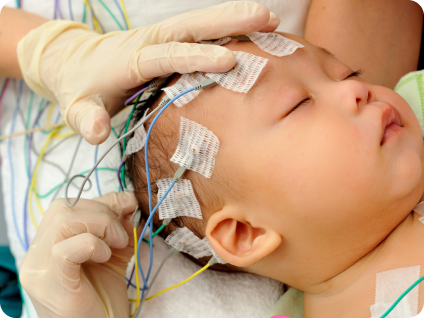What is a Seizure?
Epilepsy is the fourth most common neurological disorder in the world. If you have epilepsy, surges of electrical activity in your brain can cause recurring seizures. We can help you understand everything you need to know about epilepsy and what you can do about it.
What happens in the brain during a seizure?
The electrical activity is caused by complex chemical changes that occur in nerve cells.
Brain cells either excite or inhibit (stop) other brain cells from sending messages. Usually there is a balance of cells that excite and those that can stop these messages. However, when a seizure occurs, there may be too much or too little activity, causing an imbalance between exciting and stopping activity. The chemical changes can lead to surges of electrical activity that cause seizures.
Seizures are not a disease in themselves. Instead, they are a symptom of many different disorders that can affect the brain. Some seizures can hardly be noticed, while others are totally disabling.

Myoclonic (MY-o-KLON-ik) seizures are brief, shock-like jerks of a muscle or a group of muscles. Myo means muscle and clonus (KLOH-nus) means rapidly alternating contraction and relaxation jerking or twitching of a muscle.
Learn More:
What happens during a seizure?If I have just one or two seizures does that mean I will get Epilepsy?
About half of the people who have one seizure without a clear cause will have another one, usually within 6 months.If there is a known cause for your seizure (for example, brain injury or other type of known brain condition), then you are twice as likely to have another seizure. If you have two seizures, there s about an 80% chance that you ll have more. If your first seizure occurred at the time of an injury or infection in the brain, then you are more likely to develop epilepsy. Often, more seizures don t occur until weeks or months after the initial injury or infection.
"The nature of seizures varies, because the lobes of the brain control different behavior, movements and experiences"
More seizures are also likely if your doctor finds abnormalities on a neurological examination (tests that are done in a doctor s office to see how the nervous system is working). An EEG test or electroencephalogram (e-LEK-tro_en_SEF-uh_LOG-ram) can look at the electrical activity of the brain and may help predict whether more seizures will occur. Certain patterns on the EEG are typical of epilepsy. If your brain waves show patterns of that type, you are about twice as likely to develop epilepsy.
Learn More:
How serious are seizures?
Primary Generalized Epilepsy
Resources
Epilepsy Centers
Epilepsy centers provide you with a team of specialists to help you diagnose your epilepsy and explore treatment options.
Epilepsy Medication
Find in-depth information on anti-seizure medications so you know what to ask your doctor.
Epilepsy and Seizures 24/7 Helpline
Call our Epilepsy and Seizures 24/7 Helpline and talk with an epilepsy information specialist or submit a question online.
Tools & Resources
Get information, tips, and more to help you manage your epilepsy.



